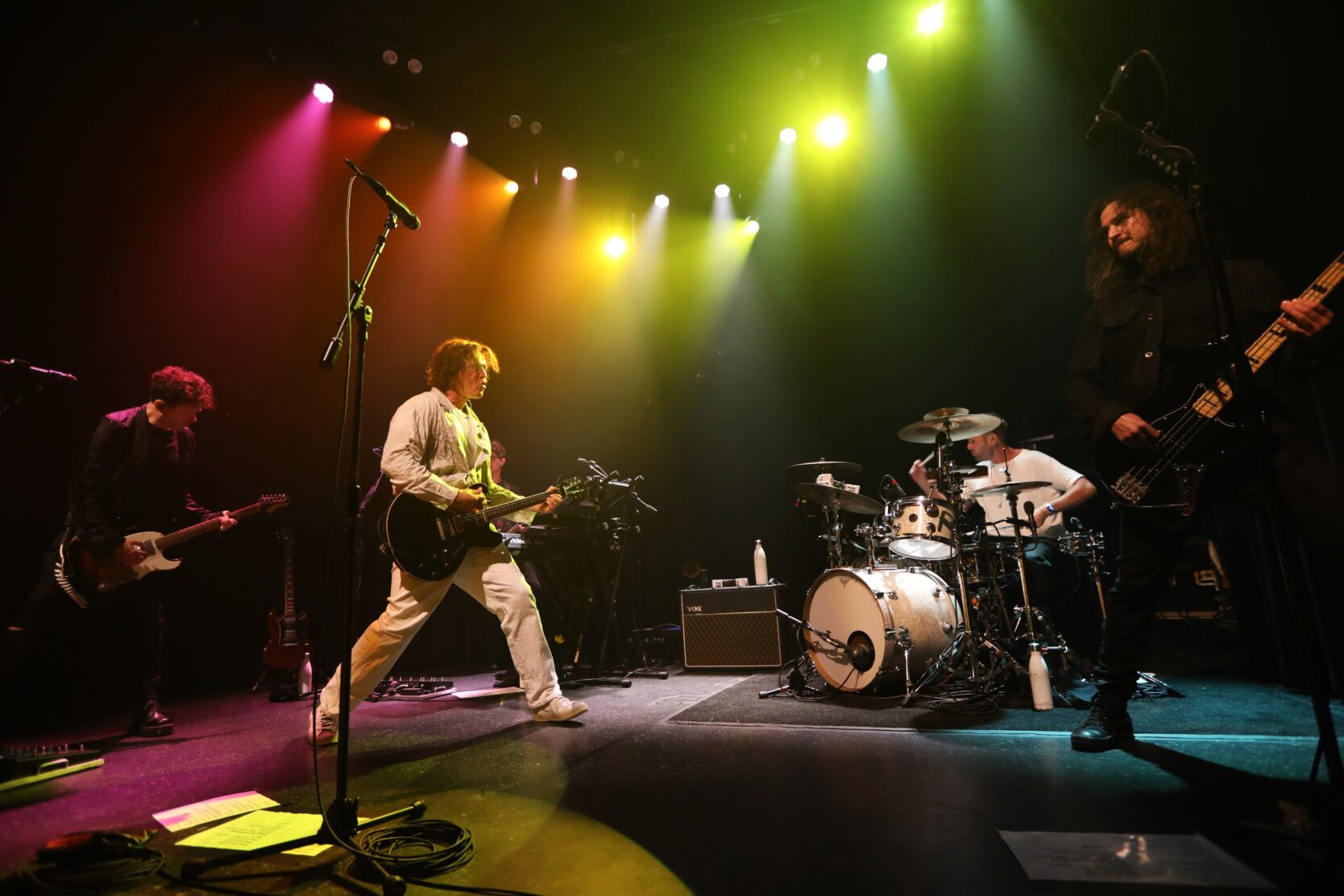Third Eye Blind’s singer, Stephan Jenkins, spoke to SPIN about environmental conservation, reducing plastic waste, and, most particularly, about the importance of reforesting California’s coasts with kelp. A portion of proceeds from the band’s ticket sales go to the re-kelping reefs, which Jenkins says is important both for carbon sequestration and for a thriving sealife.
Jenkins also has a thing or two to say about the joys of surfing.
SPIN: Do you have a long relationship with Kelp?
Stephan Jenkins: I do. It started when I was nine or 10, going up to the beach in Northern California and wanting to learn how to surf. But most importantly, I saw Jacques Cousteau in school, and this was a kind of escape into some other world that was magic to me. Having divorced parents and problems with dyslexia in school made me want to have some other space where I could remake things.
That’s what made me become obsessive with music, and also with the ocean and wanting to scuba dive. So within a few weeks of my 13th birthday, which is as young as you can be and get certified, I got certified to dive and I was constantly scuba diving.
Between my 16th and 17th year, I went to a program at UC San Diego. And because I had so much diving, I was able to get a job volunteering on transect lines and diving at Scripps. So at the age of 17, I was working off the California coast.
So fairly early in doing this and becoming a surfer and becoming someone who really supports kelp ecology, I realize it’s actually a life’s work.
What’s so important about kelp?
Kelp is the foundation of a thousand species that need it to thrive and work and interact with each other. It’s the ecosystem. When the kelp goes away, it becomes a desert, and when the kelp shows up, it becomes this lush, lush forest.
I call it the American Amazon. This is what we have off the coast of California, and as a surfer, we’re there in it, and it’s very natural to have a desire to protect this place that we play in and that gives us so much.
I’ll tell you — I see it like this: I’m going to die doing my part to rewild America in this massive space. And it feels like a good thing. I can look [back] at my life and go, yes, I did it. I can be done.
Do you eat it?
Do I eat kelp? Now? Um, I mean, I eat sea seaweed, but no, I’m not a consumer of it, per se.
When you were a kid of divorce, was it a sanctuary from anxiety?
Yeah. You slip into the waves, and you are in your own world. Even now as a surfer, I don’t medicate with anything besides coffee, but I need to go surfing preferably every day. When you paddle out into the ocean, you are in wildness and your whole state changes. All that antsiness or all the cobwebs that are in your mind just immediately go. Your mind goes from red, from gray, to blue. It just immediately opens up like that. That’s what surfing in the ocean does for me.
Could you talk me through a moment where everything’s kind of come together that way and you’re out on the water?
Have you been injured surfing?
Yeah. Right when I started surfing, I flipped over the front of my board, hit the sand, and broke my neck. A whole side of my body went to sleep. So I had to learn to surf with a lot of fear of the injuries that come with it. It’s a contact sport. It’s like rugby.
I guess it’s keeping you fit and fresh.
Definitely. It gives me a sense of both physical and mental wellness. [Talking about it is] getting me stroked now. I want to go surfing. It’s this desire to be in the presence. And as surfers we have this awareness, and we feel a duty to protect it.
I have made this connection with touring where Third Eye Blind has sought — as have Pearl Jam and Coldplay and other bands — to reduce how much carbon we are incurring by going on tour in the summer.
It started first with the awareness that everyone was drinking out of plastic bottles: one single-use plastic container after another. And they’re convenient, so it’s very hard to get rid of. On one tour with Live Nation we said: “No plastic bottles. Period. Them’s the rules.”
So we have bubblers, and you can bring your own canteen, and that’s the end of that. Is it difficult? It’s as difficult as it was before we had single-use plastic bottles. It’s that hard. Unbelievable. Now we’re giving you the convenience of big bubblers of water where you can fill up your canteen and have water. It’s that convenient.
And [before that] you would see these pallet racks that are brought in on forklifts carrying thousands of bottles of water. Which now we’ve skipped — and we counted it; we did the math. In one tour we saved 16,500 single-use plastic bottles with the caps and everything. Because they all end up in the ocean eventually, man. That all ended.
Then we thought about just what we were putting out with all these buses and flying and trucks. We have three tour buses and three or four trucks when we’re just going on a mid-size tour playing 10,000-seat places in the summer.
What does that cost? How can we offset it? Well, offsetting doesn’t really work, but you can try. And so we worked with a group that was doing trees, and I had done some work years ago saving the Tongass rainforest [in Alaska]. So it felt like there was a connection there.
But then I was thinking about kelp. Kelp is this incredible natural sequestration mechanism for holding onto carbon. It pulls the carbon out of the air and then grows two feet a week. It’s massive. You can have a 200-foot kelp forest come up in a few months. And then when it dies, it breaks off; most of it floats out into the ocean, sinks, and sits down there for 20,000 years. It doesn’t burn. It’s incredible.
But there’s less than 10% of it left off the California coast. So I love the idea of making Third Eye Blind touring into a vehicle for rewilding our coast. We have our own reef. It’s called the Blind Reef. We took part of our ticket and did the budget to restore and replant this reef. You do it all at once and it comes up, and then that system begins to take care of itself.
There’s another group called Future Self founded by Mark Pincus [founder of mobile gaming company Zynga]. He matched us. He has the Future Reef, which is going to be the first restored reef off Santa Cruz Island. I want to get all of the reefs off California to be delineated. And that’s a big, big process. I want to get kelp to be a class-one carbon credit.
My idea is to make it like a basketball stadium and have naming rights. I want the Google Reef. I want the Salesforce Reef. I want every corporation to compete over whose reef is bigger than the other’s. And when we do this for all of California, that will seed Oregon, and Oregon will seed Washington, and Washington will seed British Columbia. And now we have a space that is the size of the Amazon rainforest, and it’s off the North American coast.
Does that get you excited? It does, right? It is hot to me. These are days of wonder. We can do amazing, amazing things. There are technologies right now that, coupled with the collective will, can do glorious, glorious things.
Do you like the feel of kelp against you?
Well, it gets caught in my [surfboard] leash. When I’m in Santa Cruz, I’ll take off on a wave and I’ll get caught on bull kelp and go flying over the front. It’s like hitting a rock on your skateboard and kinda going flying. And you can get stuck in it.
But I love scuba diving in it. It’s like you’re up in the canopy, and there are surf perch and ling cod, steller sea lions, octopus down at the base, our California fish: the garibaldi. It’s all up in there and happening. I love being part of that.
When I’m driving up the coast through Davenport, which is my spiritual home, I love seeing the kelp beds flowing out there. And when I’m up in Santa Barbara — and the channel islands, Santa Miguel and Santa Cruz — we have these big kelp forests out there.
Are there enemies in the way of kelp reforestation?
Yeah. There’s the regulatory process which is very slow, and then there’s the funding. We need more funding. We are beginning to see some, but we need more of a collective will to do this.
There’s a mindset that says that when you spend money to protect something, it’s bad because it’s socialism, but the way I see it is that what I’m doing is conservative. I am defending California. I’m defending the coast. This is defending our land, even though it’s in the ocean.
If you’re in the water with surfers and you dump some trash into the ocean, you should prepare to get your ass beat. We see the ocean as something that we protect. So I want the mindset to grow. Until it does, that’s the obstacle.
Republicans need to see it that way. They have before. Richard Nixon was a magnificent, successful environmentalist. The Clean Air Act, the Clean Water Act: These were all enhanced by Nixon. And the greatest environmentalist of all time was Republican: Teddy Roosevelt.
Here’s a playlist from our friend Stephan:
Hobo Dave-Thunderbird – Hobo Dave is the post surf shesh acoustic punk guitar archetype so much so this whole playlist should be him, but that would be unfair.
Hockey Dad- Good Eye – I have actually surfed with Hockey Dad as well as toured with them so I can say with confidence this is legit what surfing sounds like in guitar rock duo form and it is legit.
Blondshell- Veronica Mars – I could have picked any song on Blondshell’s spectacular debut and it would have been welcome on this playlist. Behold SoCal’s new surf rock princess.
Naked Giants- Turns Blue – Live your dreams in ocean size and lock eyes with a beautiful beach creature and fall in love forever on a foggy day with salt water in your hair.
Finn Foxell- Cool Bless Safe – Before paddling out I like to get my mind clear, crisp and aloof much life Finn’s south London drill delivery. It is surf music? I says it is!
Bonus Track – Third Eye Blind- Weightless – Usually reference my ocean life in bits and bobs, it’s the only one entirely about the emotion of surfing and the ups and downs of getting lost in the world of nomadic surf culture. See you out there.





